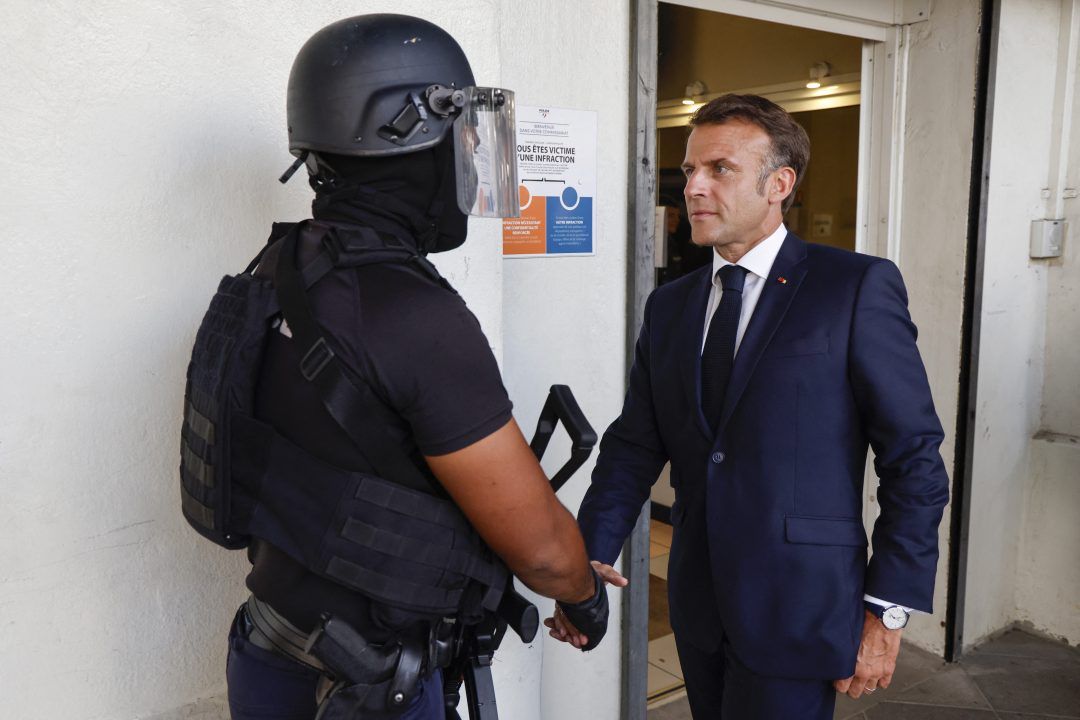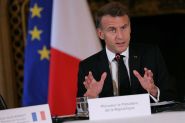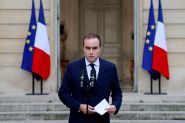- Home
- Middle East
- Macron in New Caledonia Vows to Quell "Insurrection"

©LUDOVIC MARIN/POOL/AFP
Emmanuel Macron has vowed to quell an "unprecedented insurrection" in New Caledonia on Thursday as he visits the region rife with unrest.
France's president visited the restive Pacific territory of New Caledonia on Thursday, urging a "return to peace" after deadly rioting, and vowing thousands of military reinforcements will be deployed for "as long as necessary" to quell the "unprecedented insurrection."
Emmanuel Macron arrived in the capital, Noumea, seeking ways to end more than a week of looting, arson, and clashes that have left six people dead and hundreds injured. The unrest erupted over a French voting reform plan that Indigenous Kanaks say will dilute their voice.
As he exited the plane at Tontouta International Airport, the French leader told reporters he wanted to ensure that "as quickly as possible, there will be a return to peace, calm, and security."
He is expected to spend about 12 hours on the ground.
France has ruled New Caledonia since the 1800s, but many Indigenous Kanaks still resent Paris's power over their islands and want fuller autonomy or independence.
Since May 13, separatists have thrown up barricades that have cut off whole neighborhoods and the main route to the international airport, which remains shuttered.
People of French and other origins have blocked off streets in their own neighborhoods in response.
It had been a "totally unprecedented movement of insurrection," Macron said.
Nightly riots have seen scores of cars, schools, shops, and businesses burned.
The French authorities have imposed a state of emergency, placed separatist leaders under house arrest, banned alcohol sales, and sent around 3,000 troops, police, and other security reinforcements to quell the turmoil.
The fact that Macron is willing to make such a long journey just weeks before key European elections may show just how high the stakes are.
His visit began with a minute of silence for the dead and an hours-long discussion with local elected officials before visiting a police station to thank security forces.
"By the end of the day," there would be "decisions" and "announcements" about the next steps, Macron promised, while adding that he could extend his stay if needed.
Security forces would also "stay for as long as necessary, even during the Olympic and Paralympic Games" to be held in Paris in July–August.
New Caledonia is 17,000 kilometers (10,500 miles) from the French mainland but remains both part of France and a strategic outpost in an increasingly contested region.
New Caledonia is also attractive as one of the world's largest nickel producers, with up to 30 percent of global reserves.
The archipelago's deadliest unrest in four decades was sparked by French plans to give voting rights to thousands of non-indigenous long-term residents, something Kanaks say would dilute the influence of their votes.
New Caledonia has on three occasions rejected independence in referendums.
But the last of those ballots took place during the COVID-19 pandemic and was boycotted by much of the Kanak population.
Pro-independence leaders were present at the president's first meeting Thursday, ahead of a second set to focus more closely on the political issues facing the territory.
Hundreds of tourists from Australia and New Zealand have begun to flee the turmoil, although hundreds more remain trapped.
But there was anger Thursday that Macron's visit, which includes a large security footprint at both Noumea's domestic and international airports, had put further repatriation flights on hold.
Mathuerin Derel, Charlotte Mannevy, and Francesco Fontemaggi, with AFP
France's president visited the restive Pacific territory of New Caledonia on Thursday, urging a "return to peace" after deadly rioting, and vowing thousands of military reinforcements will be deployed for "as long as necessary" to quell the "unprecedented insurrection."
Emmanuel Macron arrived in the capital, Noumea, seeking ways to end more than a week of looting, arson, and clashes that have left six people dead and hundreds injured. The unrest erupted over a French voting reform plan that Indigenous Kanaks say will dilute their voice.
As he exited the plane at Tontouta International Airport, the French leader told reporters he wanted to ensure that "as quickly as possible, there will be a return to peace, calm, and security."
He is expected to spend about 12 hours on the ground.
France has ruled New Caledonia since the 1800s, but many Indigenous Kanaks still resent Paris's power over their islands and want fuller autonomy or independence.
Since May 13, separatists have thrown up barricades that have cut off whole neighborhoods and the main route to the international airport, which remains shuttered.
People of French and other origins have blocked off streets in their own neighborhoods in response.
It had been a "totally unprecedented movement of insurrection," Macron said.
Nightly riots have seen scores of cars, schools, shops, and businesses burned.
The French authorities have imposed a state of emergency, placed separatist leaders under house arrest, banned alcohol sales, and sent around 3,000 troops, police, and other security reinforcements to quell the turmoil.
'Double or Quits'
The fact that Macron is willing to make such a long journey just weeks before key European elections may show just how high the stakes are.
His visit began with a minute of silence for the dead and an hours-long discussion with local elected officials before visiting a police station to thank security forces.
"By the end of the day," there would be "decisions" and "announcements" about the next steps, Macron promised, while adding that he could extend his stay if needed.
Security forces would also "stay for as long as necessary, even during the Olympic and Paralympic Games" to be held in Paris in July–August.
New Caledonia is 17,000 kilometers (10,500 miles) from the French mainland but remains both part of France and a strategic outpost in an increasingly contested region.
New Caledonia is also attractive as one of the world's largest nickel producers, with up to 30 percent of global reserves.
The archipelago's deadliest unrest in four decades was sparked by French plans to give voting rights to thousands of non-indigenous long-term residents, something Kanaks say would dilute the influence of their votes.
New Caledonia has on three occasions rejected independence in referendums.
But the last of those ballots took place during the COVID-19 pandemic and was boycotted by much of the Kanak population.
Pro-independence leaders were present at the president's first meeting Thursday, ahead of a second set to focus more closely on the political issues facing the territory.
'Significant Operational Demands'
Hundreds of tourists from Australia and New Zealand have begun to flee the turmoil, although hundreds more remain trapped.
But there was anger Thursday that Macron's visit, which includes a large security footprint at both Noumea's domestic and international airports, had put further repatriation flights on hold.
Mathuerin Derel, Charlotte Mannevy, and Francesco Fontemaggi, with AFP
Read more



Comments